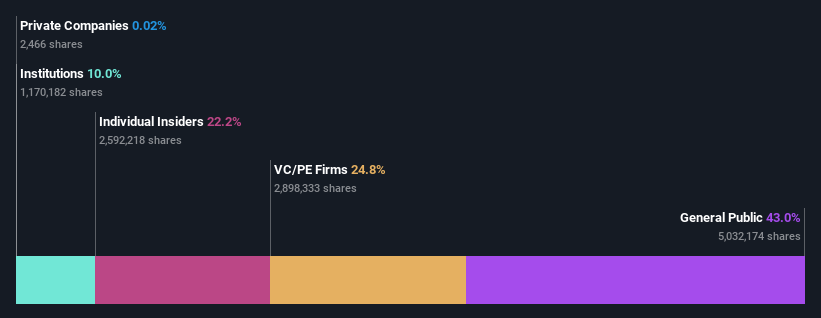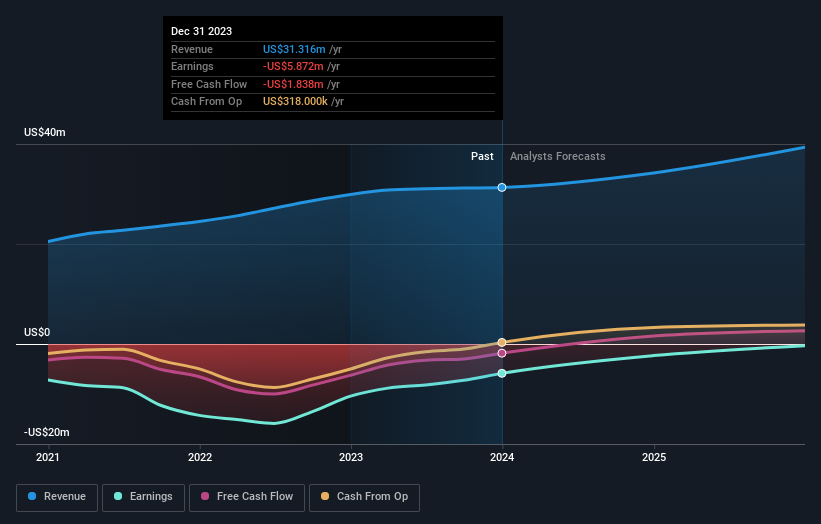AudioEye, Inc.'s (NASDAQ:AEYE) top owners are retail investors with 43% stake, while 25% is held by private equity firms
Key Insights
The considerable ownership by retail investors in AudioEye indicates that they collectively have a greater say in management and business strategy
50% of the business is held by the top 6 shareholders
To get a sense of who is truly in control of AudioEye, Inc. (NASDAQ:AEYE), it is important to understand the ownership structure of the business. We can see that retail investors own the lion's share in the company with 43% ownership. Put another way, the group faces the maximum upside potential (or downside risk).
Private equity firms, on the other hand, account for 25% of the company's stockholders.
In the chart below, we zoom in on the different ownership groups of AudioEye.
See our latest analysis for AudioEye
What Does The Institutional Ownership Tell Us About AudioEye?
Institutions typically measure themselves against a benchmark when reporting to their own investors, so they often become more enthusiastic about a stock once it's included in a major index. We would expect most companies to have some institutions on the register, especially if they are growing.
As you can see, institutional investors have a fair amount of stake in AudioEye. This implies the analysts working for those institutions have looked at the stock and they like it. But just like anyone else, they could be wrong. If multiple institutions change their view on a stock at the same time, you could see the share price drop fast. It's therefore worth looking at AudioEye's earnings history below. Of course, the future is what really matters.
We note that hedge funds don't have a meaningful investment in AudioEye. Sero Capital is currently the company's largest shareholder with 25% of shares outstanding. With 7.7% and 7.4% of the shares outstanding respectively, Carr Bettis and Keith Kosow are the second and third largest shareholders. Carr Bettis, who is the second-largest shareholder, also happens to hold the title of Top Key Executive. Furthermore, CEO David Moradi is the owner of 4.8% of the company's shares.
We did some more digging and found that 6 of the top shareholders account for roughly 50% of the register, implying that along with larger shareholders, there are a few smaller shareholders, thereby balancing out each others interests somewhat.
While it makes sense to study institutional ownership data for a company, it also makes sense to study analyst sentiments to know which way the wind is blowing. There are plenty of analysts covering the stock, so it might be worth seeing what they are forecasting, too.
Insider Ownership Of AudioEye
The definition of company insiders can be subjective and does vary between jurisdictions. Our data reflects individual insiders, capturing board members at the very least. Management ultimately answers to the board. However, it is not uncommon for managers to be executive board members, especially if they are a founder or the CEO.
Insider ownership is positive when it signals leadership are thinking like the true owners of the company. However, high insider ownership can also give immense power to a small group within the company. This can be negative in some circumstances.
Our information suggests that insiders maintain a significant holding in AudioEye, Inc.. Insiders have a US$27m stake in this US$120m business. This may suggest that the founders still own a lot of shares. You can click here to see if they have been buying or selling.
General Public Ownership
The general public, who are usually individual investors, hold a 43% stake in AudioEye. While this group can't necessarily call the shots, it can certainly have a real influence on how the company is run.
Private Equity Ownership
Private equity firms hold a 25% stake in AudioEye. This suggests they can be influential in key policy decisions. Some might like this, because private equity are sometimes activists who hold management accountable. But other times, private equity is selling out, having taking the company public.
Next Steps:
While it is well worth considering the different groups that own a company, there are other factors that are even more important. For instance, we've identified 2 warning signs for AudioEye that you should be aware of.
If you would prefer discover what analysts are predicting in terms of future growth, do not miss this free report on analyst forecasts.
NB: Figures in this article are calculated using data from the last twelve months, which refer to the 12-month period ending on the last date of the month the financial statement is dated. This may not be consistent with full year annual report figures.
Have feedback on this article? Concerned about the content? Get in touch with us directly. Alternatively, email editorial-team (at) simplywallst.com.
This article by Simply Wall St is general in nature. We provide commentary based on historical data and analyst forecasts only using an unbiased methodology and our articles are not intended to be financial advice. It does not constitute a recommendation to buy or sell any stock, and does not take account of your objectives, or your financial situation. We aim to bring you long-term focused analysis driven by fundamental data. Note that our analysis may not factor in the latest price-sensitive company announcements or qualitative material. Simply Wall St has no position in any stocks mentioned.


